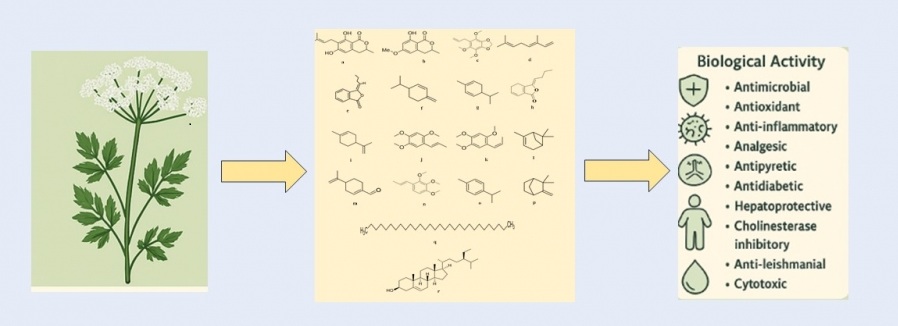JOURNAL 3627
Records of Agricultural and Food Chemistry
Available Online: October 24,2025
p.1 - 9
http://doi.org/10.25135/rfac.36.2508.3627 (DOI number will be activated after the manuscript has been available in an issue.)
Viewed 473 times.
GRAPHICAL ABSTRACT

ABSTRACT
Pleurospermum angelicoides, a perennial Apiaceae herb native to the high-altitude Himalayan region, has long been valued in traditional medicine for treating ailments such as fever, typhoid, and dysentery. Despite this ethnomedicinal relevance, comprehensive scientific syntheses on its phytochemistry and pharmacology remain limited. This review addresses this gap by systematically compiling and analysing literature on the species’ distribution, morphology, traditional uses, phytochemical diversity, and biological activities. Sources were identified through targeted searches of peer-reviewed journals, ethnobotanical records, and phytochemical databases. The available evidence highlights a remarkable spectrum of bioactive constituents, including coumarins, phenylpropanoids (e.g., nothoapiole, α-asarone), and terpenoids (p-cymene, camphene), with notable variations in essential oil profiles across plant parts and geographic locations. Pharmacological studies confirm antimicrobial and antioxidant activities, validating several traditional claims and underscoring the therapeutic promise of its extracts and essential oils. These findings suggest that P. angelicoides could serve as a natural source of lead compounds for novel drug development. In addition to summarising current knowledge, this review emphasises critical research gaps, particularly regarding molecular mechanisms, pharmacodynamics, and clinical validation. Unlike earlier scattered reports, it provides the first integrative account of the species’ phytochemical and pharmacological potential, thereby establishing a foundation for its broader application in modern herbal medicine and pharmaceutical innovation.
KEYWORDS- Pleurospermum angelicoides
- food preservation
- ethnomedicine
- phytochemistry
- antimicrobial activity
- antioxidant potential